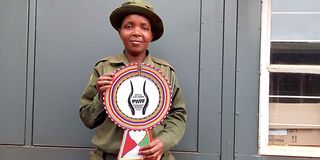Childhood passion drives Taita Taveta ranger to break barrier in conservation

Wildlife Works ranger Constance Mwandaa displays the Special Jury Award at this year’s Pridelands Wildlife Film Festival for the short film "Portrait of a Ranger: Connie". She was recognised for her commitment to safeguarding Kenya's wildlife in the Tsavo conservation area.
What you need to know:
- Ms Mwandaa, now 32, is a role model in the largely male-dominated area of wildlife conservation.
- Her dream took shape in 2010 when she learned about a recruitment drive by Wildlife Works for its Kasigau Corridor REDD+ Project.
Born at the heart of Taita Taveta County, where elephants roam freely and cases of human-wildlife conflict is rife, Constance Mwandaa found her calling.
As she grew up in the elephant-infested area of Sagalla village in Voi, her passion for wildlife conservation was ignited during her childhood visits to the parks with her parents and during school trips.
These early experiences planted a seed of desire to protect the wildlife that she so admired.
“I used to see wildlife now and then and I aspired to work around them to protect them," she says.
Fast forward to 2024, Ms Mwandaa, now 32, is a role model in the largely male-dominated area of wildlife conservation.
Her journey, marked by determination and resilience, recently earned her the Special Jury Award at Pridelands Wildlife Film Festival (PWFF) for the short film “Portrait of a Ranger: Connie” because of her commitment to safeguarding Kenya's wildlife in the Tsavo conservation area.
Her dream took shape in 2010 when she learned about a recruitment drive by Wildlife Works for its Kasigau Corridor REDD+ Project.
Driven by her childhood passion, she participated and was selected, launching her remarkable career. She started working at Wildlife Works in 2011, and since then, she has been a powerful force, working tirelessly day and night in often hostile conditions to protect wildlife on the conservation frontline.
Fourteen years ago, only men were considered for the job, but besides Ms Mwandaa, three other female rangers were selected, marking a significant step towards gender inclusivity in the field.
“Since we were in different camps, we used to call each other to know how the going was. It was difficult, but we were determined to make it,” she recalls.
Today, there are just 10 female rangers against 100 men, but despite the challenges, her determination saw her rise through the ranks to become a senior sergeant and an instructor.
As a senior sergeant, she not only leads but also trains rangers, imparting her knowledge and experience to the generation of wildlife protectors.
“My role as an instructor is important because I equip rangers with the skills needed to navigate the harsh realities of the bush. I underwent many training where I always excelled,” she says.
While protecting Tsavo's wildlife and the environment at large, from poachers and other illegal activities, she says the journey has not been without its challenges.
Since rangers are in direct communication with local communities and respond quickly to reports of wildlife crime and human-wildlife conflict, being called at the wee hours of the night to respond to these cases is not unusual.
“The bush is an unforgiving environment, and the dangers are real. What seems like a normal patrol day can turn into an ambush by poachers. However, we are always well prepared," she says.
Since joining Wildlife Works 13 years ago, she has paved the way for more female rangers, where today, she is one of 10 women in a growing team of over 100 rangers.
She dreams of a future where more women join the ranks of wildlife rangers, where gender is no longer a barrier to pursuing one's passion.
“My achievement is not just a personal victory but a milestone for all women in conservation. I want my journey to motivate other aspiring female conservation rangers to enter this fulfilling field and take a role in the protection of our wildlife and wildlands. I always encourage them to work hard and pursue this career,” she says.
She says her work at Wildlife Works is not just about protecting wildlife but also about creating a legacy of conservation that future generations can build upon.
Coming from a community where it does not value wildlife because of the frequent human-wildlife conflicts and lack of sustainable livelihoods, Ms Mwandaa has involved herself in sensitising people to love and protect wildlife and the environment by moving away from poaching and charcoal burning.
“I know some depend on poaching and charcoal burning for livelihoods. But my advice to them is that a thriving ecosystem benefits everyone. This is not a sustainable livelihood. I encourage them to love the wildlife and our environment," she says.
As the world celebrates World Ranger Day, Ms Mwandaa represents the countless unsung heroes who put their lives on the line to protect wildlife and wildlands.
“I want my story to show that it is possible to break barriers and achieve your dreams, no matter the challenges. This is a call to action for all of us to support and champion the cause of conservation,” she says.





